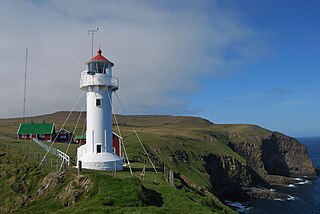 W
WAkraberg is the southern tip of Suðuroy, 5 km south from the village Sumba, Faroe Islands. The name Akraberg derives from akur. Five kilometres south of Akraberg is the southernmost point of The Faroe Islands, a rock called Munkurin, also called Sumbiarsteinur, which is one of a group of six rocks. This group of rocks are called Flesjarnar. The sound between Suðuroy and Munkurin is notorious for its strong current, it is called Røstin, the poet Poul F. Joensen mentioned it in one of his poems "...Røstin rísin rann...".
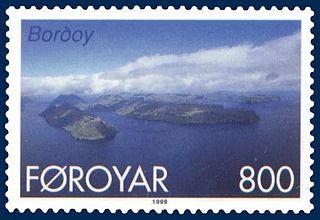 W
WBorðoy is an island in the north-east of the Faroe Islands. Its name means 'headland island'. There are eight settlements: Klaksvík, Norðoyri, Ánir, Árnafjørður, Strond, Norðtoftir, Depil and Norðdepil.
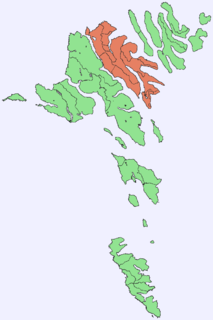 W
WEysturoy (pronounced ['estroi] meaning 'East Island' is a region and the second-largest of the Faroe Islands in the North Atlantic, both in size and population.
 W
WFugloy is the easternmost island in the Faroe Islands.
 W
WHestur is an island in the central Faroe Islands, to the west of Streymoy and the south of Koltur. Hestur means horse in Faroese.
 W
WKalsoy is an island in the north-east of the Faroe Islands of Denmark between Eysturoy and Kunoy. The name means man island; by contrast with the parallel island to the east, Kunoy, the name of which means woman island.
 W
WKoltur is an island in the Faroe Islands, located to the west of Streymoy and to the north-west of Hestur. The name 'Koltur' means 'colt', in contrast with the name of the larger island to the south-east, 'Hestur', which means 'horse'. The island has just one settlement, Koltur. It was abandoned in the 1980s by the sheep-farmers whose flocks grazed on the southern part of the island. Since then only two people have returned. Koltur has two mountains, Kolturshamar and Fjallið (101m) which strictly speaking is not a mountain, the name however translates directly as "The Mountain" and is considered by many as the smallest mountain in the country.
 W
WKunoy (meaning Woman island, is an island located in the north-east of the Faroe Islands between Kalsoy to the west and Borðoy to the east.
 W
WLítla Dímun is a small, uninhabited island between the islands of Suðuroy and Stóra Dímun in the Faroe Islands. It is the smallest of the main 18 islands, being less than a square kilometre in area, and is the only uninhabited one. The island can be seen from the villages of Hvalba and Sandvík.
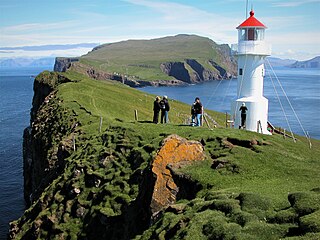 W
WMykines is the westernmost of the 18 main islands of the Faroese Archipelago.
 W
WNólsoy is an island and village in central Faroe Islands, 4 km east of the capital Tórshavn in Streymoy.
 W
WSandoy ("Sand Island" is the first of the five southern islands that make up the Faroe chain, the fifth biggest of all the Faroe Islands, an autonomous region of the Kingdom of Denmark. It also refers to the region that includes this island along with Skúvoy and Stóra Dímun. As of January 2020, the largest population center on the island is the village of Sandur with a population of 532. Other settlements include Skarvanes, Skopun, Skálavík, Húsavík and Dalur.
 W
WSkúvoy or Skúgvoy is an island in the central Faroe Islands, located to the south of Sandoy.
 W
WStóra Dímun is an island in the southern Faroe Islands, sometimes only referred to as Dímun. It is accessible by sea only during periods of clear and calm weather, but there is a regular helicopter service twice a week all year. There is a lighthouse on the island.
 W
WStreymoy is the largest and most populated island of the Faroe Islands. The capital, Tórshavn, is located on its southeast coast. The name means "island of currents". It also refers to the largest region of the country that also includes the islands of Hestur, Koltur and Nólsoy.
 W
WSuðuroy is the southernmost of the Faroe Islands. The island covers 163.7 square kilometres (63.2 sq mi). In 2017 there were 4,607 inhabitants, but there has been a gradual decline in the population numbers ever since the 1950s. In 2005 the population had been 5,036. Suðuroy region comprises this island and Lítla Dímun, the next isle northward in the Faroes, which is uninhabited.
 W
WSvínoy is an island located in the north-east of the Faroe Islands, to the east of Borðoy and Viðoy. It takes its name from Old Norse, Svíney, meaning "Swine Isle". Svinoy also refers to a section of the ocean where North Atlantic water flows into the Norwegian Sea. There is a similarly named island, Swona, in the Orkney Islands.
 W
WVágar is one of the 18 islands in the archipelago of the Faroe Islands and the most westerly of the large islands. With a size of 178 square kilometres, it ranks number three, behind Streymoy and Eysturoy. Vágar region also comprises the island of Mykines.
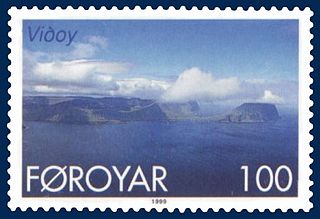 W
WViðoy is the northernmost island in the Faroe Islands, located east of Borðoy to which it is linked via a causeway. The name means wood island, despite the fact that no trees grow on the island; the name relates to the driftwood that floats in from Siberia and North America.